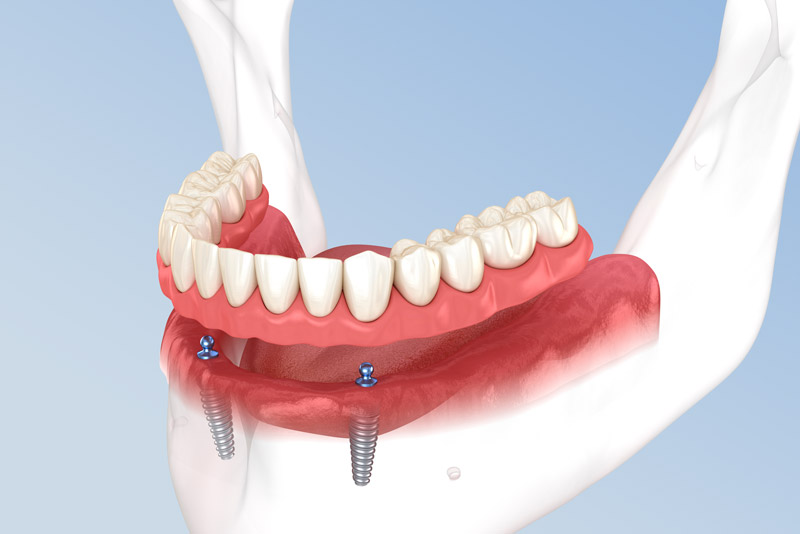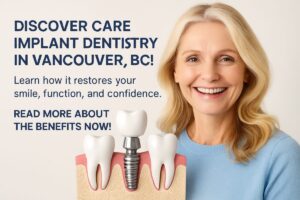Many patients ask “what is implant dentures” when they are unhappy with loose or uncomfortable teeth replacements. Implant-supported dentures are prostheses anchored to dental implants — small titanium posts placed in the jaw — that give greater stability, comfort, and chewing power than traditional dentures. They also help protect long-term oral health by preserving bone and reducing tissue irritation.
This guide explains what implant dentures are, the main types, who makes a good candidate, what the treatment involves, and what to expect for timeline and cost. If you’re in Vancouver, BC and wondering if implant dentures could work for you, this will help you prepare for a consultation.
What are implant dentures?
A common patient question is “what is implant dentures” and how they differ from ordinary dentures. Unlike standard dentures that rest on the gums, implant dentures attach to implanted titanium posts. The system has three basic parts:
- Dental implants: titanium posts surgically placed in the jawbone that act like tooth roots.
- Abutments: connectors that join the implants to the denture prosthesis.
- Denture prosthesis: the visible set of teeth, made to fit over the abutments and look natural.
Types of implant dentures and how they work
Removable implant-supported overdentures
Removable overdentures clip onto two or more implants using snap-on attachments or a bar that connects the implants. They are taken out nightly for cleaning.
Pros: easier cleaning, lower cost than fixed options, and improved stability over traditional dentures. Cons: still removable, some movement possible, and attachments may need maintenance or replacement over time.
Fixed implant-supported dentures (hybrid / All-on-4 style)
Fixed prostheses are permanently attached to several implants and are not removed daily. The All-on-4 style anchors a full arch to four or more implants placed at strategic angles to maximise support.
Pros: feels more like natural teeth, very stable for eating and speaking, and often permanent-looking. Cons: higher cost, more complex surgery, and cleaning requires special tools and technique under professional guidance.
Materials and biocompatibility: denture teeth and bases can be acrylic or porcelain. Implants are usually titanium or titanium alloys, chosen for strength and biocompatibility. Your clinician will recommend materials based on function, esthetics, and health needs.
Benefits, candidacy, and what to expect
- Key benefits: improved chewing and speech, greater comfort, less slippage, better facial support, and preservation of jawbone over time.
- Who is a good candidate: people with multiple missing teeth or unstable dentures, enough jawbone to support implants (or willing to have bone grafting), and generally good health. Controlled chronic conditions may still allow treatment with proper planning.
- Health considerations: diabetes should be well controlled, and smoking increases risk of implant failure. Your dentist will review medications and medical history to reduce risks.
- Risks and maintenance: common risks include infection, implant failure, or sore spots. Long-term success requires good oral hygiene, avoiding smoking, and regular dental visits for professional care and adjustments.
Treatment process, timeline and costs (what the patient can expect)
- Consultation and 3D imaging: assessment, scans, and a personalised plan. Many patients ask “what is implant dentures in Vancouver, BC” during this visit to get local options and cost estimates.
- Treatment planning: surgical guides and implant positioning are planned using digital tools.
- Implant placement: implants are surgically placed into the jawbone. Temporary teeth may be provided the same day in some cases.
- Healing (osseointegration): bone fuses to implants over weeks to months — typically 2–6 months, depending on the case.
- Fitting the denture: after healing, abutments and the final denture are fitted and adjusted for comfort and function.
- Follow-up: regular check-ups to monitor implants, prosthesis fit, and oral health.
Typical timelines range from a few months to a year if bone grafting or staged treatments are needed. Costs vary widely based on the type of prosthesis, number of implants, laboratory fees, and any preparatory work. For a personalised estimate and to explore payment options, book a consult — many clinics offer financing plans or can guide you on insurance coverage.
ARCH Dental + Aesthetics — personalised implant denture care
ARCH Dental + Aesthetics in Vancouver, BC offers customised implant and cosmetic dentistry with a holistic approach that prioritises overall well-being. Led by Dr. Yusef Khadembashi, the clinic focuses on evidence-based, personalised full-mouth reconstruction using biocompatible materials and advanced digital planning.
ARCH collaborates with Enlighten Dental to provide integrated general, periodontal, and orthodontic support when needed. If you’re asking “what is implant dentures” for your smile and health, contact ARCH Dental + Aesthetics to arrange a consultation and get a tailored plan for your needs.






